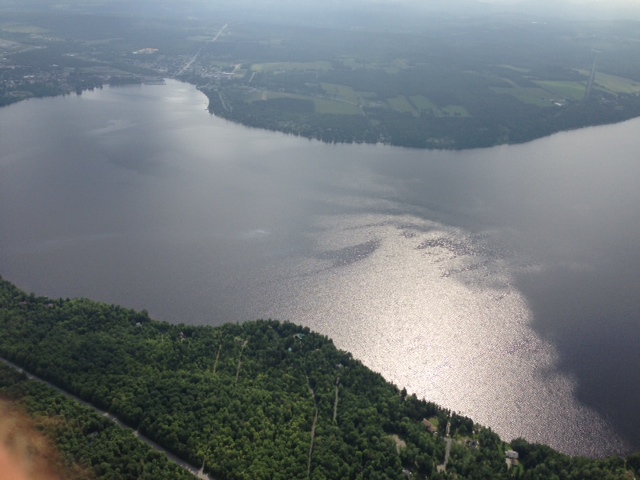TORONTO – The train derailment that devastated the small town of Lac-Mégantic, Quebec may have far-reaching consequences for both the people and environment.

The derailment and resulting explosion caused about 100,000 to 200,000 litres of oil to spill into the lake and surrounding ground, raising the question as to how badly affected the communities will be.
Though every oil spill is detrimental to the environment, if there can be any good news, it’s that the oil from the July 6 accident was light crude oil, which makes it easier to clean up than had it been heavier oil. Lighter oil stays on the surface where crews can contain it.
Environment Quebec Assistant Deputy Minister Michel Rousseau said that, so far, the ministry is in control of the oil spilled into Lac Mégantic, but that the cleanup on the Chaudière River is taking more of an effort.
According to the ministry, when the explosion occurred, the winds were to the west, which kept the oil closer to the shore at Lac Mégantic.
However, on the Chaudière River, he added, the spill extends up to 60 km away, with the highest concentration within the first 10 km.
“We have a lot of oil to pump,” he said.
Rousseau said that none of the surrounding communities are under boil-water advisories due to the oil spill. Those communities upstream from the spill, like St. Georges des Beauce and Sainte-Marie, are no longer taking their water from the Chaudiere River. However, Mégantic has issued a boil-water advisory due to “micro-organisms.”
But the explosion and contamination of the water is of concern to the David Suzuki Foundation.
“When the explosion occurred, there was a release of what we call PAH, or polycyclic aromatic hydrocarbons,” said Jean-Patrick Toussaint, Science Project Manager for the David Suzuki Foundation in Montreal. “So this is a compound that is normally found when we actually burn oil, fuel or gas and it’s quite toxic. That’s one of the reasons why the citizens were evacuated.”
“It’s still a little bit early to tell what the consequences will be, how long they will last for, in terms of the health issues for citizens, but also in terms of the environment,” said Toussaint. “Especially with the oil that found its way into the river. But it might take a few weeks or, worse case scenario, a few years before we actually see the full impacts of that issue.”
Read: Quebec creates $60M fund for Lac-Mégantic; police confirm 60 missing in blast
- Enter at your own risk: New home security camera aims paintballs at intruders
- High benzene levels detected near Ontario First Nation for weeks, residents report sickness
- Beijing orders Apple to pull WhatsApp, Threads from its China app store
- Boston Dynamics unveils ‘creepy’ new fully electric humanoid robot
Rousseau said that there has been little impact on the wildlife so far. Fewer than five birds have been found dead, he said.
However, the ministry has yet to determine the full extent of the environmental concerns: they were only granted access to the “red zone” — the zone closest to the explosion and under investigation — on Tuesday, and even then, only for a few minutes.
Toussaint said that there is concern about how marine life will be affected. Oil usually ends up in fatty tissues of organisms. Plants and animals dependent on the river will also be impacted. And it might take weeks or years to see just what those effects will be.
Rousseau said that the cleanup efforts will take some time. “Don’t even ask me about that,” he said. “We just don’t know.”


Comments